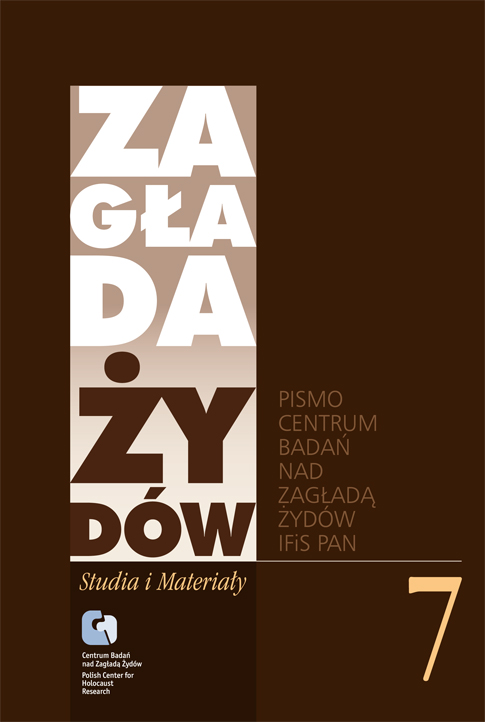Forgiveness as a Category of Modern Memory Discourse as Seen in Jarosław Marek Rymkiewicz’s Kinderszenen and Simon Wiesenthal’s The Sunflower: On the Possibilities and Limits of Forgiveness
Zagłada Żydów. Studia i Materiały, No. 7 (2011), Pages: 269-278
Submission Date: 2020-12-13Publication Date: 2011-12-10
 https://doi.org/10.32927/zzsim.786
https://doi.org/10.32927/zzsim.786
Abstract
Przebaczenie jako kategoria współczesnego dyskursu pamięci na przykładzie Kinderszenen Jarosława Marka Rymkiewicza i Słonecznika Szymona Wiesenthala Forgiveness as a Category of Modern Memory Discourse as Seen in Jarosław Marek Rymkiewicz’s Kinderszenen and Simon Wiesenthal’s The Sunflower:On the Possibilities and Limits of Forgiveness The text attempts to describe forgiveness as one of the key categories of modern memory discourse. To this end the authors analyzed two texts: Kinderszenen by Jarosław Marek Rymkiewicz and Simon Wiesenthal’s The Sunflower: On the Possibilities and Limits of Forgiveness. Even though the two texts talk explicitly about forgiveness, the unexpressed discourse rules they are based on turn out to be equally interesting. Among them, following Jacques Derrida’s suggestion, it is possible to attribute the biggest importance to the definition of the “unforgivable,” towards which the question about the act of forgiveness occurs to be secondary. Paralleled reading of the two texts allows us then to see that it is not an act of forgiveness or lack of forgiveness, but a call for forgiveness (or for no forgiveness) which constitutes the basic practice of memory today. The attitude toward this call is the basis on which memory communities constitute themselves.
Keywords
memory , anthropology of memory , forgiveness , Holocaust , Warsaw Uprising
License
Copyright (c) 2011 Author & "Holocaust Studies and Materials"

This work is licensed under a Creative Commons Attribution 4.0 International License.
https://creativecommons.org/licenses/by/4.0
Most read articles by the same author(s)
- Paweł Dobrosielski, Defenders of Faith. Key Disputes on the Polish-Jewish Past Since 2015 , Zagłada Żydów. Studia i Materiały: No. 18 (2022)
- Paweł Dobrosielski, Marek Hłasko’s short story “Szukając gwiazd” [Searching for the stars] as a parable of the Holocaust and a mythical “initial event” in his ) , Zagłada Żydów. Studia i Materiały: No. 4 (2008)
Similar Articles
- Jacek Leociak, Anniversaries of the Warsaw Ghetto Uprising in public discourse (with special reference to the years 1943–1944, 1968 and 2023) , Zagłada Żydów. Studia i Materiały: No. 19 (2023)
- Jacek Leociak, Understanding the Holocaust. A Task for Generations , Zagłada Żydów. Studia i Materiały: 2008: Holocaust Studies and Materials
- Gabriel Finder, Bernard Mark, the Uprising in the Warsaw Ghetto, and Jürgen Stroop’s Trial , Zagłada Żydów. Studia i Materiały: No. 13 (2017)
- Marta Duch-Dyngosz, In Search of Local Memory of the Holocaust. The Case of Commemoration of Jewish Communities in Smaller Towns in Contemporary Poland , Zagłada Żydów. Studia i Materiały: No. 17 (2021)
- Dan Michman, Dutch Society and the Jewish Fate: A Puzzling Record , Zagłada Żydów. Studia i Materiały: No. 12 (2016)
- Jacek Leociak, Marta Tomczok, Affective Holocaust Kitsch – Introduction , Zagłada Żydów. Studia i Materiały: No. 17 (2021)
- Stephan Lehnstaedt, German Occupants in Warsaw and the Publicness of the Holocaust , Zagłada Żydów. Studia i Materiały: No. 12 (2016)
- Jacek Leociak, “History and Memory after the Holocaust in Germany, Poland, Russia, and Britain” , Zagłada Żydów. Studia i Materiały: No. 3 (2007)
- Sharon Geva, Underground fighters, mothers and daughters. Jewish women in the Warsaw Ghetto during the uprising (April–May 1943) , Zagłada Żydów. Studia i Materiały: No. 19 (2023)
- Adam Kopciowski, Pinkes Warsze - Warsaw Chronicle , Zagłada Żydów. Studia i Materiały: No. 10 (2014)
1 2 3 4 5 6 7 8 9 10 11 12 13 14 15 16 17 18 19 20 21 22 23 24 25 26 27 28 29 30 31 32 33 34 35 36 37 38 39 40 41 42 43 44 45 46 47 48 49 50 > >>
You may also start an advanced similarity search for this article.
 English
English
 Język Polski
Język Polski








